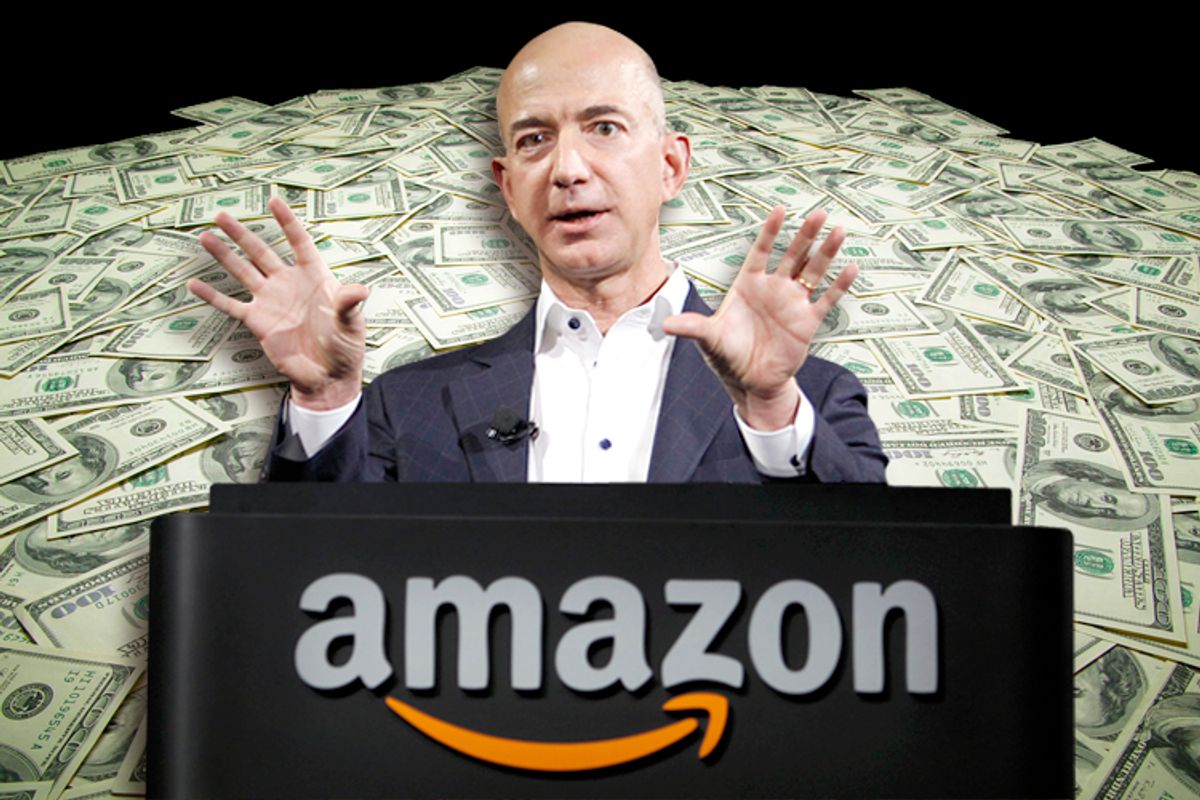Amazon.com has been on a march upward toward perhaps becoming the world’s most valuable publicly traded company. At $372 billion, the online retailer and bookseller is now ranked No. 4 in market capitalization, just behind Facebook and ahead of Berkshire Hathaway. And Amazon could soon rocket its way to become No. 3 behind Apple and Google, according to a recent chorus of Wall Street analysts.
Yet while Amazon.com has commanded an immense presence in the world of retail and cloud storage, until recently it has lacked a certain coolness factor like, say, Apple has had with its iPhones and Google with its self-driving cars. Other than releasing the Kindle e-reader (essentially a delivery device for its online bookselling business), the Seattle company has had a pretty grim track record in coming up with electronics bling. Remember the Fire Phone? You don't? Well, you're not alone — it was discontinued last year after 13 months of sluggish sales.
For years investors have tolerated Amazon.com’s lackluster performance on the gadgets front, betting that the company’s future was bright and that someday it would become profitable. And investors have stuck with Amazon.com despite the knocks it’s taken on several fronts, including criticism over its treatment of employees, ruthless underpicing that's perceived as hurting small retailers and ample tax-avoidance strategies — not to mention swipes that it’s driving publishers out of business. Despite these criticisms, Amazon’s online retail business has remained immensely popular with consumers.
In July Amazon.com did something it’s had never done before; it booked its fifth consecutive quarterly profit. No longer dependent on the holiday sales boost, the company appears to be on its way to emerging as more of a traditional blue-chip multinational — one releasing a regular stream of profitable returns.
Just last year Amazon launched a new product that significantly boosted its coolness factor: its Echo “smart” home speaker. Echo responds to voice commands and serves, in effect, as an artificially intelligent assistant. It’s too soon to say if Echo — and Alexa, the artificial intelligence software that underpins Echo’s voice-activated system — can become as popular as the iPhone and Siri but it’s the company’s most promising attempt.
Earlier this year Bernstein became the first investment advisory firm to raise its stock price target for Amazon to $1,000, citing the immense potential in the company’s cloud services division: Amazon Web Services is the world’s largest provider of storage, database and analytics infrastructure and controls a third of the global market for those services. All sorts of companies and organizations from Netflix to the CIA rely on Amazon.com’s cloud services.
And this month Amazon.com’s share price touched a record high of $790 after the company announced it would expand its takeout-delivery service in the U.K. And last week two Wall Street firms raised the company’s 12-month price target to $1,000 a share, citing Amazon.com’s investments in logistics and the potential of its Echo “smart” home speaker.
The company is in a position “to apply automation to drive audience conversion while similarly applying it to warehousing and delivery," analyst Ken Sena wrote in a research note on Friday, referring to Amazon’s growing fleet of warehouse robots and its nascent Prime Air drone-delivery service. "This stands to drive not only greater overall customer satisfaction through shorter delivery times, narrower delivery windows and lower overall delivery costs, but operating margin expansion for Amazon as well.”
Meanwhile, Mark Mahaney at RBC Capital in a note to investors justified his upgrade of Amazon’s stock price target by focusing on Alexa’s potential. Already millions of households have embraced the company’s Echo, which has received tens of thousands of positive online reviews. Mahaney said the device will boost sales for Amazon.com and increase demand for its Amazon Prime subscriptions.
“As Alexa’s skills library grows and more devices are ‘Alexa-enabled,’ we expect to see a corresponding rise in consumer usage,” wrote Mahaney, who has predicted that Alexa could be as big to Amazon’s future growth as Google’s search has been for Alphabet.
Amazon.com is also racking up accolades for its video-production arm.
Amazon Studios took home two Emmy awards Sunday for “Transparent”: Jill Soloway won for Outstanding Directing in a Comedy Series and Jeffrey Tambor won for Outstanding Lead Actor in a Comedy Series. The two won the same awards last year.
Thus Amazon's businesses might not quite yet be as sexy cool as other tech firms’ but the company may finally be coming into its own as a profitability powerhouse.

Shares